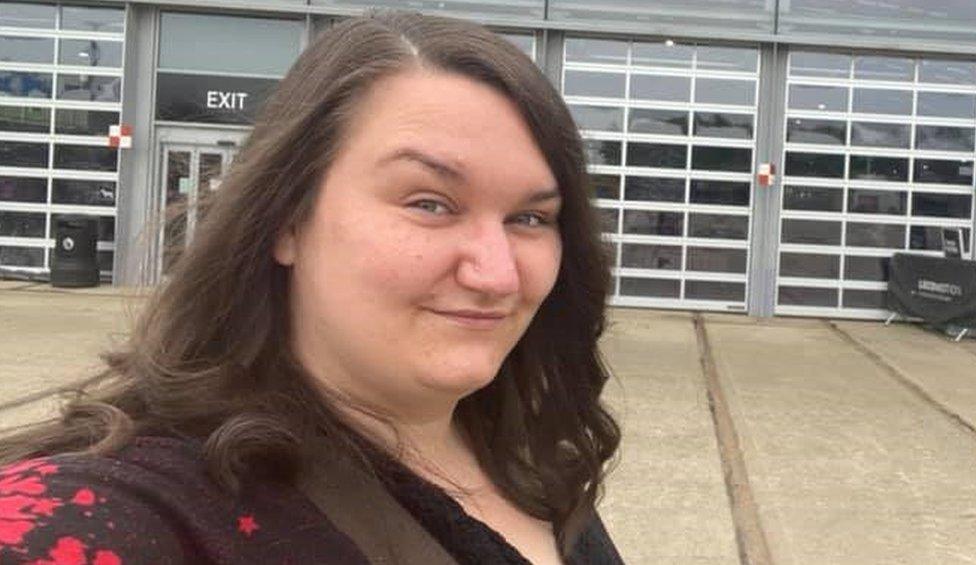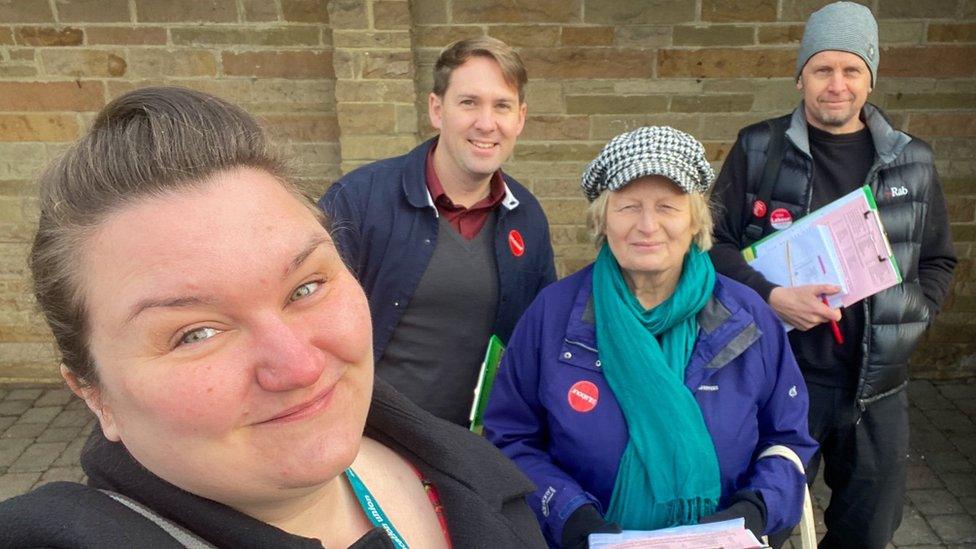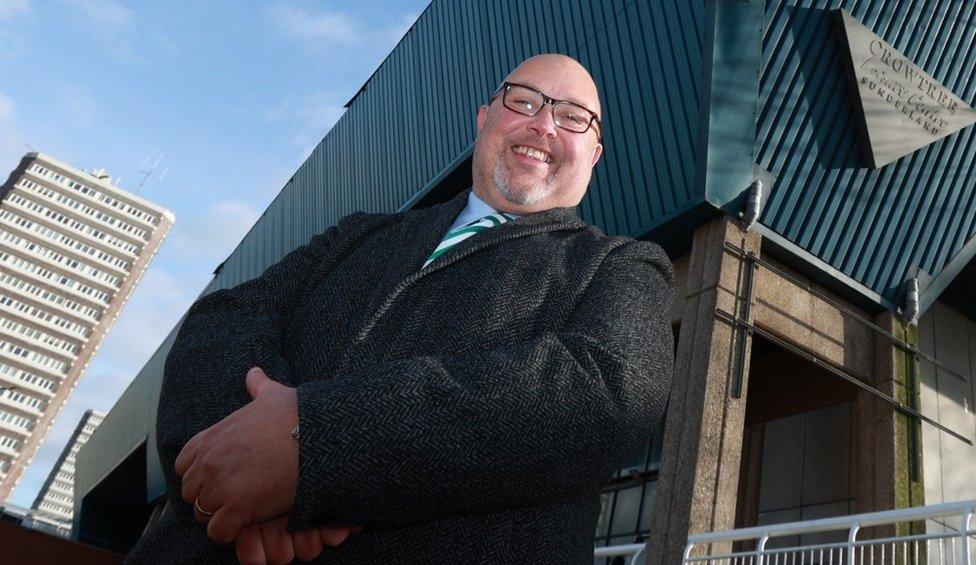Councillor abuse: From body-shaming to threatening to burn house down
- Published

Samantha Townsend kept abuse she faced online a secret for about a year
Fat-shaming, homophobic attacks and threats to burn down your house are just some of the online abuse four elected representatives have suffered while serving their communities.
Some are now calling for better legal protection against social media trolls for people who have been voted in.

"[The abuse] was mainly targeting around my weight, my appearance - I just don't think men get that to the same degree," Samantha Townsend said.
She was elected as a Labour councillor on Durham County Council in May, representing Shildon and Dene Valley.
Her political career took off about five years ago as a parish councillor, which was when she began to be attacked online.

Samantha Townsend says the threats did not stop her from standing for election
"The low level stuff is unthinking remarks, people casually saying, 'I'll have you dragged out to the street and shot', like it's a normal thing to say," she said.
"The more extreme level was a period of two years where somebody set up an anonymous Twitter account to harass and try and intimidate me.
"It's a horrible feeling in the pit of your stomach when you pick up your phone and you see that somebody else has posted a picture of you with an awful comment next to it."
'Know where you live'
It took her a year before she opened up to friends about what was happening.
"It hits you out of nowhere, it makes you feel sick but also it's just that awareness that someone is targeting you - and they know where you live," she said.
Although Twitter removed some posts and accounts they began to reappear under a different guise.
Ms Townsend found that police did not have the resources "to grapple with" the social media giants.
Despite what happened she never let the experience put her off local politics.
"I actually went further - I went from being a parish councillor to a county councillor because I just thought I'm not going to let these people win," she said.

Newcastle's Nick Forbes has called for a specific crime for intimidating people in elected office
Labour's Nick Forbes has led Newcastle City Council since 2011 and was first elected as a councillor in 2000.
He has spoken about homophobic and threatening abuse he has received online - something he says has got worse in the last three years.
"It sometimes feels I am fighting a very lonely fight by challenging them all," he said.
"It really upsets me and it upsets my family too that sexual orientation is somehow seen as a legitimate thing to attack somebody for and some of the abuse that I've had comparing me, for example, with Jimmy Savile has been outright offensive and I think defamatory.
"Actively trying to find your home address for example, or actively calling for you to be shot, which is one of the things that somebody did."
'Threatened to burn house down'
Mr Forbes - who was awarded a CBE for services to local government - said he has "no problem" with people making criticisms about the decisions he makes but when it makes him fear for his own safety it has to stop.
He has called for a change in the law to make it a specific crime for intimidating people in elected office.
"One of the things that has been said to me, even by the police in the past, is 'Oh well, you should just be able to put up with that because as an elected figure, that goes with the job' - but abuse shouldn't go with anyone's job, nobody should feel intimidated or threatened," he said.
"If we don't stop the small-scale abuse, we have seen how that can escalate into major incidents and in some cases murder of elected politicians.
"Social media companies should make sure they know exactly who is behind every account and if the police want to investigate they have a duty to disclose who is behind those accounts."

Sunderland's Graeme Miller received threats to burn his home down
Sunderland's Labour council leader Graeme Miller has spoken about "vicious" threats not only made against him, but also to his family.
"It descended into anonymous trolls online threatening to burn the house down, to get a sniper to basically deal with me - an anonymous letter in the post threatening to burn my house down while me, my wife and my children slept," he said.
"Over time it's a terrible, terrible drain on you."
He took advice from police about securing his home, which is now rigged with cameras and mail cannot be posted through his door.
"At the end of the day anyone can set up an anonymised account on Facebook and Facebook won't do anything about it unless there's a clear threat of violence," he said.
"It has to be addressed and I'm very, very disappointed that the government refuses and has been refusing for a long time now to grasp the nettle here and enforce on the social media companies - you make them responsible, through unlimited fines."

Conservative MP Sir David Amess was killed in his constituency in October
In October 2021, Conservative MP Sir David Amess was killed while meeting constituents in Leigh-on-Sea, five years after Labour MP Jo Cox was murdered in her own constituency.
Matt Vickers, the Conservative MP for Stockton South, was a councillor before being elected to parliament. He says he too has received abuse.
"We have had death threats, we have had the lot," he told BBC Politics North.
"To an extent over time you build that rough, tough skin and you sort of get by - you shouldn't have to but that's where we are at."
He said "the right balance" had to be found over how it is tackled.
The Online Safety Bill - which the government says is one of the first attempts to lay down in law a set of rules about how online platforms should deal with content - is currently being discussed in Parliament.

Labour MP Jo Cox was murdered in 2016 in her constituency
The Local Government Association, which represents councils in England, said there was "an increasing number" of councillors and candidates being subjected to abuse, threats and public intimidation.
Social media companies say they have rules to protect users from abuse, which include suspending, restricting or shutting down accounts.
The Crown Prosecution Service said trolling - which involves sending abusive and hurtful comments on social media - can be prosecuted under, external the Malicious Communication Act 1988 and the Communications Act 2003.
A spokesperson for the Department for Digital, Culture, Media and Sport said online safety laws would "tackle online abuse and force social media companies to stamp out harmful behaviour" and improve their complaints systems.

Follow BBC North East & Cumbria on Twitter, external, Facebook, external and Instagram, external. Send your story ideas to northeastandcumbria@bbc.co.uk, external.
- Published6 December 2021

- Published20 October 2021

- Published18 October 2021
